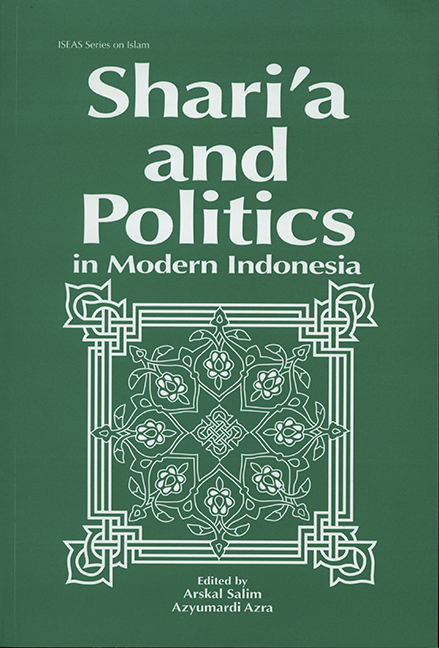Book contents
- Frontmatter
- Contents
- Acknowledgments
- List of Contributors
- Glossary
- 1 INTRODUCTION: The State and Shari'a in the Perspective of Indonesian Legal Politics
- 2 LAW AND POLITICS IN POST-INDEPENDENCE INDONESIA:A Case Study of Religious and Adat Courts
- 3 THE STATE AND SHARI'A IN INDONESIA
- 4 THE STATE'S LEGAL POLICY AND THE DEVELOPMENT OF ISLAMIC LAW IN INDONESIA'S NEW ORDER
- 5 THE INDONESIAN MARRIAGE LAW OF 1974: An Institutionalization of the Shari'a for Social Changes
- 6 INDONESIA'S 1989 RELIGIOUS JUDICATURE ACT: Islamization of Indonesia or Indonesianization of Islam?
- 7 THE POLITICAL BACKDROP OF THE ENACTMENT OF THE COMPILATION OF ISLAMIC LAWS IN INDONESIA
- 8 ISLAMIZING CAPITALISM: On the Founding of Indonesia's First Islamic Bank
- 9 FATWA AND POLITICS IN INDONESIA
- 10 ZAKAT ADMINISTRATION IN POLITICS OF INDONESIAN NEW ORDER
- 11 ISLAMIC VALUES, LAW AND EXPECTATIONS IN CONTEMPORARY INDONESIA
- 12 EPILOGUE: Shari'a in Indonesia's Current Transition: An Update
- APPENDICES
- Bibliography
- Index
7 - THE POLITICAL BACKDROP OF THE ENACTMENT OF THE COMPILATION OF ISLAMIC LAWS IN INDONESIA
Published online by Cambridge University Press: 21 October 2015
- Frontmatter
- Contents
- Acknowledgments
- List of Contributors
- Glossary
- 1 INTRODUCTION: The State and Shari'a in the Perspective of Indonesian Legal Politics
- 2 LAW AND POLITICS IN POST-INDEPENDENCE INDONESIA:A Case Study of Religious and Adat Courts
- 3 THE STATE AND SHARI'A IN INDONESIA
- 4 THE STATE'S LEGAL POLICY AND THE DEVELOPMENT OF ISLAMIC LAW IN INDONESIA'S NEW ORDER
- 5 THE INDONESIAN MARRIAGE LAW OF 1974: An Institutionalization of the Shari'a for Social Changes
- 6 INDONESIA'S 1989 RELIGIOUS JUDICATURE ACT: Islamization of Indonesia or Indonesianization of Islam?
- 7 THE POLITICAL BACKDROP OF THE ENACTMENT OF THE COMPILATION OF ISLAMIC LAWS IN INDONESIA
- 8 ISLAMIZING CAPITALISM: On the Founding of Indonesia's First Islamic Bank
- 9 FATWA AND POLITICS IN INDONESIA
- 10 ZAKAT ADMINISTRATION IN POLITICS OF INDONESIAN NEW ORDER
- 11 ISLAMIC VALUES, LAW AND EXPECTATIONS IN CONTEMPORARY INDONESIA
- 12 EPILOGUE: Shari'a in Indonesia's Current Transition: An Update
- APPENDICES
- Bibliography
- Index
Summary
Introduction
Kompilasi Hukum Islam di Indonesia (KHI), literally translated as the Compilation of Islamic Laws in Indonesia, is one of many vehicles used by the Indonesian Government to unify and codify Islamic law. This codification, utilized by judges in the religious courts, was meant to serve as a reference guide in deciding cases. Before the enactment of the KHI, other efforts to unify and codify Islamic law had been tried out. A government regulation suggesting the use of only thirteen fiqh books as judicial references and the enactment of Marriage Law No. 1/1974 and Religious Judicature Act No. 7/1989 are among those efforts.
With respect to the historical perspective, efforts to unify and codify Islamic law in Indonesia may be regarded as an extension and perpetuation of Islamic legal thought expressed throughout the development of Islamic law. Notions of unification, compilation, and codification have occupied jurists from the early days of Islamic history. Ibn al-Muqaffa' (d. 139/756), for example, suggested to al–Mansur (754–775), an Abbasid Caliph, that “the caliph should review the different doctrines, codify and enact his own decisions in the interest of uniformity, and make this code binding on the kadis”. For this reason, Ibn al-Muqaffa' proposed to al-Mansur to make the al-Muwatta' of Imam Malik ibn Anas, the Medinan jurist, the standard juridical work to be used throughout the empire. During his first pilgrimage, al-Mansur met with Imam Malik and repeated al-Muqaffa's proposal to make the al-Muwatta' the standardized reference for all juristic questions, and that it be given a prominent place in the Ka'bah, with copies circulating in all parts of the empire.3 However, Imam Malik declined the suggestion, insisting that people should not be forced to adhere to the opinions of a single jurist – opinions, which might possibly be wrong and imperfect.
From the medieval era on, efforts to codify Islamic law, or in the words of Muhammad Hashim Kamali “the introduction of statutory legislation”, have been made in most Muslim countries. In the Ottoman Empire, particularly during the Tanzimat period (1839–1879), the government was successful in codifying the provisions of Islamic law and compiling them in the so-called Majallah al-Ahkam al-'Adliyah.
- Type
- Chapter
- Information
- Shari'a and Politics in Modern Indonesia , pp. 125 - 147Publisher: ISEAS–Yusof Ishak InstitutePrint publication year: 2003



